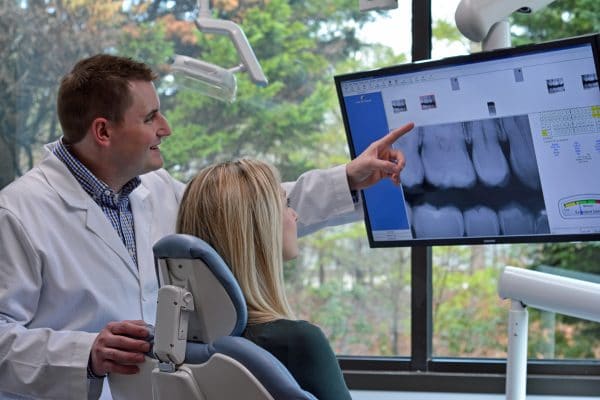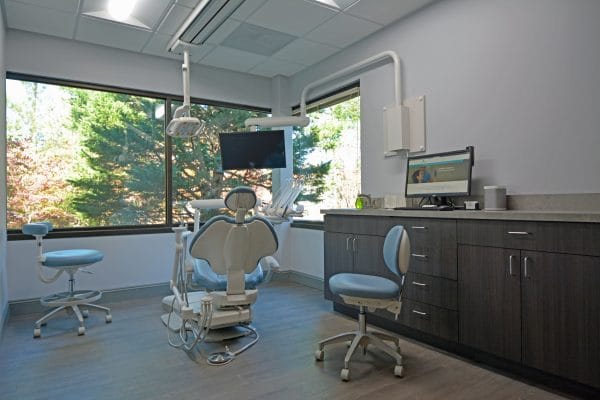Dental Cleaning & Exam Chapel Hill
fall in love with your smile
Dental Cleanings and Exams
The two best methods for maintaining exceptional oral health are to practice good daily oral hygiene habits and to schedule regular dental cleanings, at minimum, every six months. By following these best practices, you will significantly reduce your chances of developing gum diseases, cavities, or dental pain.
If you would like to schedule an appointment or if you have any questions about our treatment options, please contact our office at (919) 595-1010. We look forward to creating the smile you have always desired a reality for you.
Regular Teeth Cleaning Vs. Deep Teeth Cleaning
A regular dental cleaning is primarily focused on addressing the surfaces and areas between the teeth above the gum line. In addition to cleaning these areas, the teeth will also be polished.
A deep cleaning is significantly more intense and is performed to address and prevent periodontal disease from developing by removing plaque and tartar below the gum line. The deep cleaning process will generally begin with the application of anesthetic to numb the area. Once the area is properly numbed, special tools will be used to remove the tartar and plaque. After this has been removed, the root of your tooth will reshaped in order to prevent bacteria from collecting in the future.
Depending upon the severity of your case, your dentist will either perform the scaling and root planing procedure in one visit, or they will schedule multiple appointments to address different quadrants of the mouth.
Scaling and Root Planing Process
Scaling and root planing is often suggested for individuals who are suffering from periodontal disease. Periodontal disease refers to disease that presents in the gums, which can involve issues with gums that are bleeding or inflamed. If left untreated long enough periodontal disease can result in the deterioration of the jawbone and eventual loss of the tooth.
If you have been diagnosed with a periodontal disease, your dentist or periodontist will schedule a deep cleaning followed by a scaling and root planing procedure. During the scaling and root planing procedure, plaque and calculus will be removed which will allow for the gums to heal and the pockets that have developed to shrink.
Scaling refers to the removal of plaque and calculus to the surface of your teeth, whereas root planing refers to smoothing out your teeth’s roots to prevent additional bacteria from forming and speed up the healing process. Root Planing refers to the removal of dentin and cementum followed by the smoothing of the root. By smoothing the root, healing will be facilitated and the likelihood of additional bacteria developing will be significantly reduced.
Scaling and root planing can be a wonderful option for patients who are looking for a long-term solution for improving the health and aesthetic appearance of their smile. If you would like to learn more about the scaling and root planing procedure, please read below, or contact our staff who will be happy to answer any of your questions and/or set up a consultation. Periodontal therapy refers to a range of surgical and non-surgical techniques that are designed to address periodontal disease, which present as infection or inflammation of the gums and can result in jawbone deterioration.
Types of Gum Disease
Periodontal disease is a progressive issue that can gradually increase in severity. Most patients who develop periodontal disease do so in the following order:
- Gingivitis: The earliest stage of periodontitis, gingivitis typically develops due to bacterial plaque that builds up along the gums. Gingivitis is generally indicated by sensitive gums that are red, puffy, and bleed easily. Gingivitis can be reversed with proper cleaning and improved oral health care, but if it is not addressed quickly, it can develop into a more severe form of periodontitis.
- Early Periodontitis: Early periodontitis is caused by the continued build-up of bacterial plaque and develops when gingivitis is left untreated. Early periodontitis is generally indicated by symptoms that are like gingivitis, just more severe. The gums will feel painful and more sensitive, and brushing and flossing can result in excessive bleeding. Unlike gingivitis, which can generally be addressed through a deep cleaning and improved self-care practices, early periodontitis will likely require more intensive interventions, such as laser gum treatment.
- Advanced Periodontitis: When bacteria, plaque, and toxins have developed to the point that gum tissue is being destroyed, a patient has developed advanced periodontitis. Patients who have progressed to this point have developed small pockets between their gums and teeth, which act as breeding grounds for additional bacteria to grow. Because of the additional bacteria, these pockets expand which cause the gums to recede. If left untreated long enough, this recession can result in bone loss.
Benefits of Dental Cleaning
In addition to brightening your smile, a dental cleaning will also improve your overall health. Benefits of regular dental cleanings include the following:
- Prevent Cavities: Plaque that is allowed to collect on your teeth will inevitably begin to eat away at the enamel. Because plaque is the leading cause of decay, and because cavities that are left untreated can cause rot and significantly increase the likelihood of needing a tooth extraction, scheduling a deep cleaning to remove this plaque is one of the best ways you can preserve and maintain good oral health.
- Prevents Gum Disease: Gum disease refers to inflammation of the gums that is caused by a build-up of plaque around your teeth. The most common presentations for gum disease are bleeding when brushing your teeth. To prevent gum disease from developing, it is important to be clean plaque and tartar away with regular dental cleanings.
- Reduce Likelihood of a Heart Attack or Stroke: In addition to causing issues to your teeth and gums, the bacteria that collects in your mouth due to periodontitis can enter your bloodstream and increase your risk of having a heart attack or stroke. Research indicates that those who have gum disease are almost twice as likely to suffer from a heart attack, and are also at a significantly higher risk of having a stroke.
- Reduces risk of Diabetes: There is a direct correlation between gum disease and diabetes, given that people who have diabetes are more vulnerable to developing gum disease, and people who have gum disease are more likely to have issues regulating blood glucose levels, which can result in developing diabetes. By scheduling regular deep cleanings, you can reduce your risk of developing these issues.
- Prevents Halitosis: Patients who are suffering from periodontal or other oral health issues can commonly develop issues related to bad breath. One of the benefits to having a deep cleaning is the elimination of this issue.





High-Quality Dental Care
At Cornerstone Family Dentistry in Chapel Hill, all our services are performed with the patient in mind. We want you to feel comfortable in the dental chair, confident in our work, and most importantly, we want you to fall in love with your smile again. If you would like to schedule an appointment or if you have any questions about cosmetic procedures that we offer, please contact us at (919) 595-1010.
